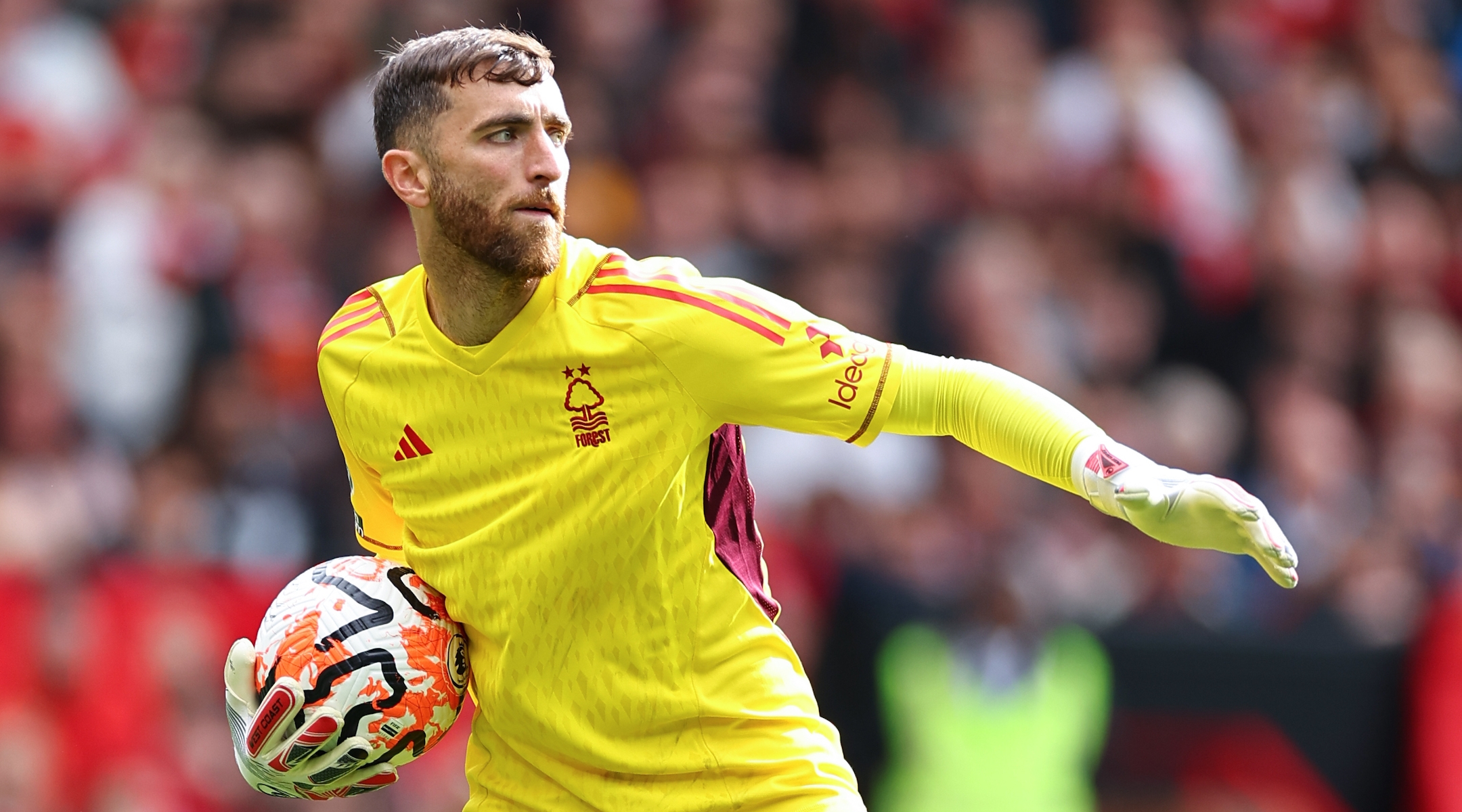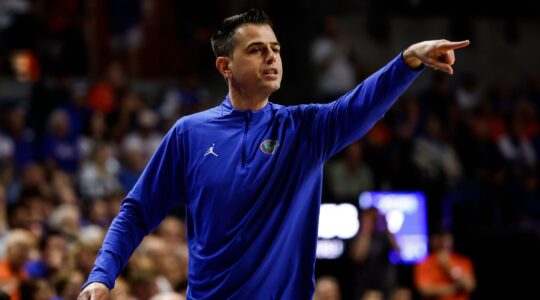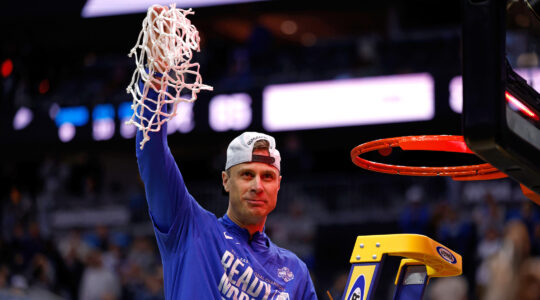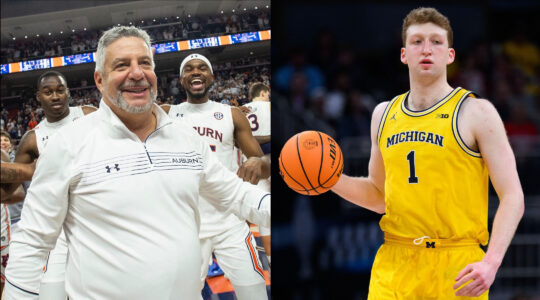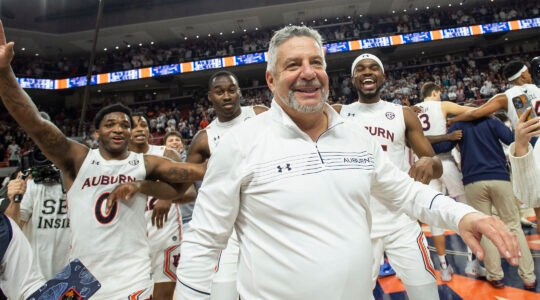(JTA) — Unexpected events converged not only to forge Matt Turner’s career as a professional soccer player. They enabled him to find Jewish roots he never knew he had.
Turner, 29, the starting goalkeeper for the U.S. men’s national team and Nottingham Forest in England’s Premier League, discovered those roots in finding his paternal great-grandmother’s emigration papers. Those papers allowed her to leave Lithuania and escape the Holocaust, which claimed the lives of over 150,000 Lithuanian Jews.
“Once I found the documents, I was certainly very, very excited,” Turner told the Jewish Telegraphic Agency. “America, in general, it’s a melting pot, and everybody has those roots elsewhere. So to understand your story, your history a little bit is really nice.”
Before finding those documents, Turner’s curiosity about his roots went unfulfilled while growing up in Park Ridge, New Jersey.
“Growing up in northern New Jersey, you’re around everyone who has a bit of identity about their family life,” he said. “There’s a lot of Italian-Americans, a lot of Irish-Americans. We know families that are like, ‘Yeah, my great-grandmother came here from Italy and she’s been cooking for us for 30 years.’
“Naturally, when you’re around a pack of people, you just gravitate towards what everybody else does. Everybody celebrates Christmas and the holidays, and you want to do all those things.”
Though Turner met his great-grandparents “when I was really little,” he said, “we never had those talks, or they never talked to my parents about that stuff.”
As a result, Turner’s Jewish father, Stuart, and his Catholic mother, Cindy, had no specific answers to his questions.
“Whenever I asked my parents, ‘Where’s our family from?’ I never got a clear, clear answer,” he said. “My mom was pretty unsure and same with my dad, to be fair.”
But when Matt and Stuart were cleaning the house of Matt’s late grandfather in 2015, they found the great-grandmother’s emigration papers. Taube Sobel left Lithuania in 1921 and arrived at Ellis Island in New York.
“My great-grandmother had a Lithuanian foreign passport issued on Aug. 25, 1920, in Kaunas that was issued in two languages, Lithuanian and German,” Turner said. “On the page in the Lithuanian language, it says that her name is Taube Sabelaite, and on the page in German language, Taube Schabel.”
But to get her emigration papers, she had to go to Riga, Latvia, where the United States had its diplomatic representative to Lithuania until 1930.
“When my great-grandmother applied for the immigration papers at the U.S. consulate in Riga, the U.S. consulate ‘simplified’ her last name into ‘Sobel,'” Turner said. “That became her last name until she got married.”
Two years later, the man who would become her husband, Polish-born Chakiel Turnovski, arrived from Paris. They married in 1927, with his name changed to Charles Turner. The family owned a multi-family home in Brooklyn, where Charles worked as a printer.
“We didn’t even know we were Lithuanian to begin with,” Turner said. “My initial feeling was, ‘Wow, this is cool.’ I finally have a little piece of me that I can look into and understand a little bit more. I was very intrigued about the history. And the more my father and I dug, the more we learned, the more connected I felt to my Jewish side, the Jewish culture of my family. It really changed a lot of me because I understood different values.”
Turner brought those values into his marriage with Ashley, whom he married in 2022. The couple has a 15-month-old son, Easton, and a daughter, Everley, born on Sept. 14. Ashley is Catholic, like Turner’s mother, and they are letting their children decide what religion they want to adopt, if any.
“The general foundations of both religions are the same, and the values of marriage would be the same,” said Turner, who identifies as Jewish. “I think it’s really great to have religion as a guideline because having faith and values and seeing the bigger picture are what we believe.
“But at the same time, we want our kids to be able to choose for themselves or connect with things for themselves. We want to open their eyes to the world and have them experience different religions in different ways and different rites of passage, have a really open mind and find things in the values that they might connect with more.”
That approach comes directly from Turner’s own experience in a household with a Jewish father and a Catholic mother.
“A lot of times, people would say that those two groups of people might not get along,” Turner said. “But I saw them love and go through conflict together and work together and be great partners, even to this day. Over time, I was able to connect with both sides in different ways at different moments in my life. I think it made me really well rounded as a person and more accepting. It was amazing to have that experience, to be honest. I’m really grateful.”
The papers also enabled Turner to consider playing professional soccer in Europe. He found them after completing his career at Fairfield University in Connecticut, where he made the All-Metro Atlantic Athletic Conference’s second team as a senior. But none of Major League Soccer’s clubs chose him in the 2016 draft, so Turner looked to Europe as an option. For that, he needed a European Union passport. Since Lithuania joined the EU in 2004, Turner applied for a Lithuanian passport.
But in the end, the New England Revolution invited Turner to camp in 2016. He made the club, became a starter in 2018 and a standout star soon after. In 2021, he was named the MLS Goalkeeper of the Year and the MLS All-Star Game’s most valuable player.
Turner received his passport in 2020 after “a three- or four-year process,” he said, but would not need it to make his biggest career move. In February 2022, two years after Great Britain left the EU (and its soccer passport rules), the Revolution sold him to Arsenal, a club in London and one of the Premier League’s perennial contenders.
Such a move might seem impossible for a goalkeeper whose career also started accidentally. Turner played baseball and basketball in high school but watching the 2010 World Cup transformed him.
The turning point came one day before Turner’s 16th birthday, when Landon Donovan scored a late goal to give the United States a 1-0 win against Algeria, helping them move on to the round of 16.
“I watched so many games, so many sports, and nothing made me feel quite like I felt in that moment,” he said. “I was jumping up and down, screaming and cheering. I’d never done that for any other sport. I just realized right then and there that there’s something different about this sport, the way it makes me feel and the way it brings people together.”
Donovan’s goal motivated Turner to join his first youth soccer club and get a goalkeeper coach at 16. Despite that late start, Turner developed enough to receive his first invitation to the national team’s training camp in 2019.
But the young goalkeeper made an inauspicious impression in that camp, as coach Gregg Berhalter recalled.
“We’re doing a training exercise,” Berhalter said. “He receives the ball and he goes to throw it and then he second guesses himself and throws into his own goal.”
From that discouraging start, however, Turner blossomed. After making his international debut in 2021, Turner started all four of the U.S. national team’s matches in the 2022 World Cup, keeping England and Iran to 0 goals. Since joining the national team, Turner won awards as the best goalkeeper in the 2021 CONCACAF Gold Cup and 2022-23 CONCACAF Nations League tournaments.
By now, he has amassed 20 career victories and 20 career clean sheets in just 33 games, a quicker rate than any other goalkeeper in the national team’s history. Berhalter called Turner’s development “abnormal.”
“You don’t have a guy go to Fairfield and then start in the World Cup for the national team,” Berhalter said. “It all has to do with his work ethic. His learning curve is steep but he learns really quickly and applies it.”
With Arsenal, Turner played only five games last season, so the club sold him in August to Nottingham Forest, where he started the club’s first six games and earned his first Premier League clean sheet Sept. 2, a 1-0 win against powerhouse Chelsea.
“I’m forged in fire, as I like to say,” Turner said at his first press conference with Nottingham Forest.
So were his Lithuanian Jewish great-grandparents, a fact Turner chooses not to take for granted.
“I’m sure a lot of families from either side have gone through hell to give their families a better life,” he said. “It lit a fire inside of me to repay my great-grandparents for taking the risks that they did to make it over to the United States, and provide us with the opportunities that we might not have had elsewhere in the world.”
JTA has documented Jewish history in real-time for over a century. Keep our journalism strong by joining us in supporting independent, award-winning reporting.
